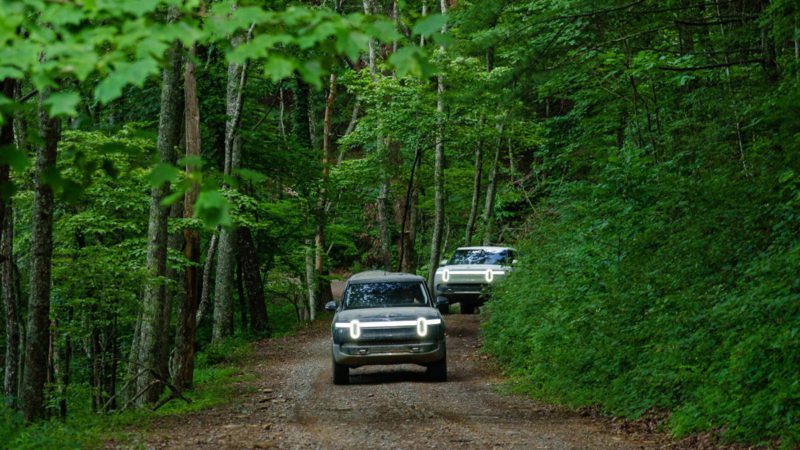EV startup Rivian will build a $US5 billion ($A7bn) electric vehicle development and manufacturing factory in the US state of Georgia, capable of building 400,000 EVs a year when ramped up to full production.
The new site will be its second EV factory, joining its Normal, Illinois facility which has an annual production capacity of 150,000.
The state of Georgia has dubbed the announcement “the single-largest economic development project in state history,” and said it cements the state’s ambitions to play a role in “this booming industry for generations to come.”
Amazon-backed Rivian – which in November went public on the Nasdaq stock exchange and immediately became the US’ sixth most valuable carmaker – plans to start building the factory in mid-2022, and expects to start production of electric vehicles in Georgia from 2024.
The EV maker has not made clear which of its three electric models it will build at the factory, or if it will develop new models there.
It currently has two models available to the driving public in the US – the R1T utility truck, and the R1S SUV. Both are lifestyle-focused vehicles aimed at the adventure and off-road market, and the company started producing first editions of these for customers in September.
Rivian has also developed an electric RCV van in collaboration with online retail giant Amazon, and says it will begin selling it to other customers from 2023. In the meantime, it has made a commitment to supply Amazon with 100,000 through 2024.
In August, it was reported that Rivian was considering building a second factory in Texas – the location of Tesla’s third US-based factory near Austin, where it plans to build the R1T’s competitor, the Cybertruck.
At the time, Tesla CEO Elon Musk responded on Twitter to the report saying, “I’d recommend they get their first plant working. It’s insanely difficult to reach volume production at affordable unit cost.”
Brian P. Kemp, governor of Georgia, said that the state welcomes the new facility which is expected to create 7,500 jobs.
“We are so proud that Georgia will now be home to Rivian’s largest manufacturing facility,” said Kemp in a statement. “This single investment – the largest in state history – represents the future of automotive manufacturing and establishes the leading role the Peach State will play in this booming industry for generations to come.”
Georgia was chosen for its proximity to both rail and highways making it able to move products to the Port of Savannah, which has its own rail terminal, efficiently.
Perhaps cognizant of the negative attention Tesla has attracted for its Brandenburg, Berlin EV factory, which has been held up by concerns about how it is handling water treatment, the state of Georgia has taken pains in its statement about the new factory to underline the partnership it plans to nurture between Rivian and the local water and sewerage authority.
“Rivian’s decision to locate in Georgia will have a tremendous impact on the entire state,” said Georgia department of economic development commissioner Pat Wilson in a statement.
“As I have said, we will see more change in the automotive industry in the next 10 years than we have seen in the past 100, and with this announcement, Georgia will be home to one of the main drivers of this transformation.
“For Rivian, sustainability doesn’t stop with just making EVs, it is carried throughout their work, going so far as to carefully plan construction efforts at the site to preserve and protect the beauty and uniqueness of their new home.”
It has been rumoured that the UK, which like Australia also has a preference for hefty SUVs and the like, will also become home to a Rivian manufacturing facility.
If it did, it could be assumed that any units that eventually make their way to Australia would be sourced from the UK.
Rivian has confirmed that it considers Australia a key market for its rugged range of electric off-roaders, but whether it would make commercial sense to open a Rivian manufacturing facility in Australia would depend on a number of factors, starting with economic policy that welcomed and nurtured electric vehicle manufacturing.
As it is, it is understood that the waiting list for Rivian vehicles overseas is so long that the brand may not make it to Australia until 2024, even though two vehicles arrived here in August for testing and evaluation purposes.

Bridie Schmidt is associate editor for The Driven, sister site of Renew Economy. She has been writing about electric vehicles since 2018, and has a keen interest in the role that zero-emissions transport has to play in sustainability. She has participated in podcasts such as Download This Show with Marc Fennell and Shirtloads of Science with Karl Kruszelnicki and is co-organiser of the Northern Rivers Electric Vehicle Forum. Bridie also owns a Tesla Model Y and has it available for hire on evee.com.au.

